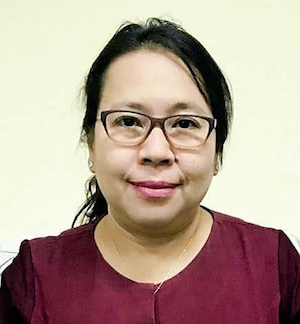 メー・トゥー・ウィン
メー・トゥー・ウィン
ミャンマー中央銀行
外貨管理部局長
Transition Economy Program ('03)
Please tell us about your career path so far. What is your area of specialization and how did you come to work in this area?
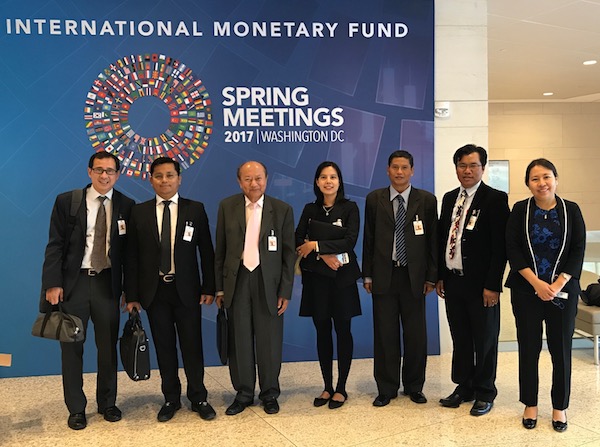
At 2017 IMF-WB Spring Meeting with Myanmar Delegation
I joined the Central Bank of Myanmar in 1993 right after my graduation from Yangon Institute of Economics where I majored in Commerce. My first assignment was in the Accounts Department and later I was moved to the Regulation Department where I worked for fifteen years. During my work in the Regulation Department I was able to celebrate a number of accomplishments. Some of these include the enactment of the Financial Institutions of Myanmar Law in 2016 and related key regulations which have changed the financial landscape into something closer resembling the international best practices. Furthermore the Mobile Financial Services Regulation was issued to allow FinTech and Mobile Network Operators (MNO) to conduct financial services which have largely underpinned the access to finance and financial inclusion.
You are currently serving as Director General of the Foreign Exchange Management Department in the Central Bank of Myanmar. What are your main roles and responsibilities?
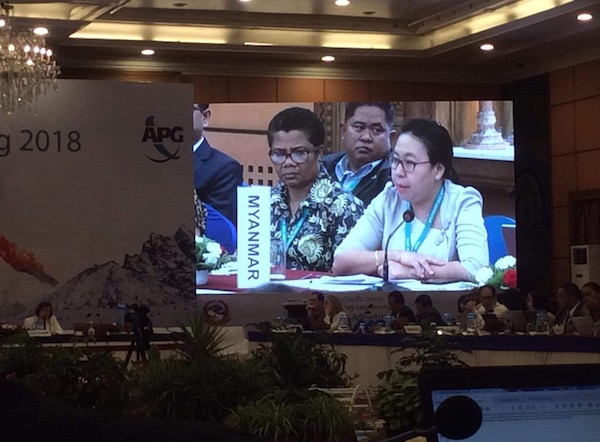
May Toe defending Myanmar's Anti-Money Laundering/Combating the Financing of Terrorism (AML/CFT) policies at the Asia / Pacific Group on Monetary Laundering (APG) Annual Meeting 2018 in Kathmandu, Nepal.
Yes, I was appointed as Director General of the Foreign Exchange Management Department in the Central Bank of Myanmar in January, 2018 where I am overseeing the foreign exchange market and stability of the value of local currency (MMK).
I am responsible for the Bank's FX operations, FX market development, licensing Authorized Dealers and FX bureaus (money changers), approval of incoming Foreign Direct Investment and external loans, follow up on export repatriation and collection of statistics related on FX market transactions.
In your current capacity, what do you see as the main opportunities and challenges for Myanmar over the course of the next five to ten years?
Myanmar is at the bottom of the lower-middle income countries group, which comes with many challenges. In my current position I am planning to concentrate on the following issues during the next five to ten years: (1) development of clear FX operations, intervention strategy, (2) development of formal FX market and decrease unauthorized FX market, (3) gradual liberalization of capital flows.
In this regard, I would like to explain more on gradual liberalization of capital flows. Myanmar has intensive capital controls. The liberalization of foreign direct investment (FDI) inflows has been successful, but the country needs wide-ranging reforms to become prepared for further liberalization. Myanmar is clearly in the first phase of liberalization, having mainly liberalized FDI inflows and embarked on implementing reforms that may facilitate further liberalization going forward. Despite considerable progress in implementing reforms in recent years, a number of key foundations of the country's capacity to safely handle capital flows are lacking.
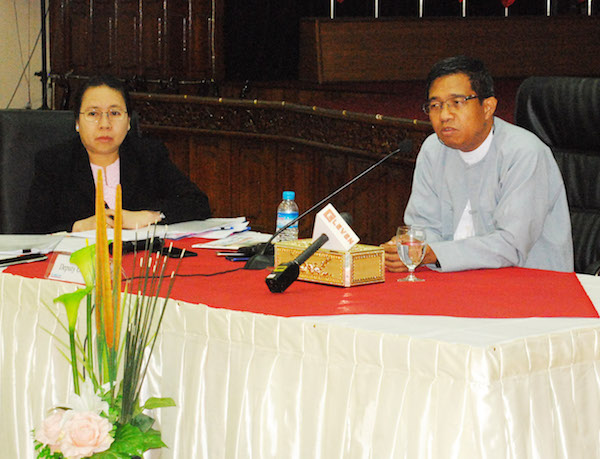
May Toe at a Press Conference regarding Exchange Rate policies with Central Bank Deputy Governor U Bo Bo Nge.
We should develop a roadmap to guide further liberalization of capital flows. The roadmap should represent a comprehensive and sequence-based liberalization strategy that maps liberalization phases to progress in introducing supporting reforms to enhance the country's capacity to safely handle freer capital flows, taking country-specific circumstances in Myanmar into consideration (e.g., the presence of the unauthorized FX market). The roadmap should envisage that the next phase of preparing further liberalization should be to progress on implementing a wide-range of supportive reforms, in particular to strengthen macroeconomic policies, the financial system, and the legal framework.
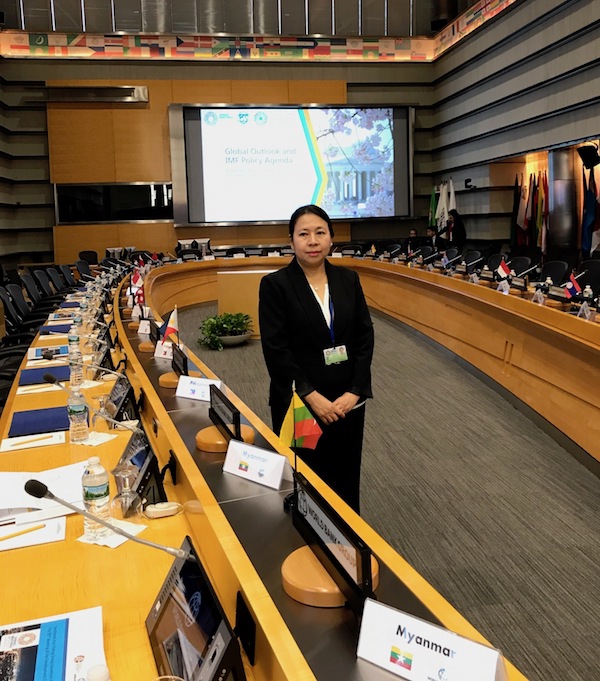
At the Board of Governor Room of the World Bank during the 2017 Spring Meeting.
The roadmap should aim to avoid backtracking through cautious implementation and be supported by a clear and comprehensive communication strategy. The need to reverse liberalization may harm confidence in the overall strategy, while an effective communication strategy may enhance confidence and ease the implementation.
When considerable progress has been made in introducing supportive reforms, a cautious liberalization of FDI outflows should be implemented. However, not until FX reserves have reached adequate levels, exchange rate flexibility is enhanced and the CBM's capacity in monetary and FX operations has increased. Following outward FDI liberalization, restrictions on other long-term in- and outflows should be gradually eased.
The desired level of liberalization may require preconditions which are challenging and require a long time to meet. An important consideration in designing the roadmap is to assess the desired level of capital account openness. Regardless of where the process is perceived to end, restrictions on short-term flows should not be lifted until experience has demonstrated the resilience of domestic institutions, balance sheets, and markets with regard to risks stemming from large and volatile capital flows.
What are some of the biggest challenges you face in your work? And what have been the most interesting or rewarding aspects of your career thus far?
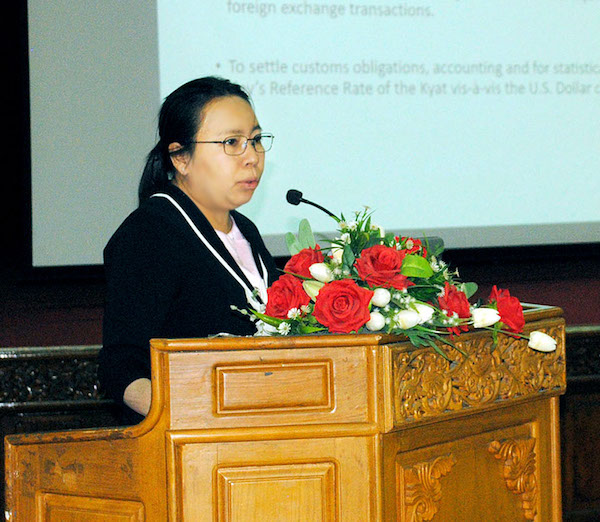
May Toe Win delivering a speech during a meeting with the banks regarding Fx issues
As I already mentioned in the previous question, my three biggest challenges in my work are: unclear FX intervention strategy, unauthorized FX market and intensive capital controls, which I am going to address in the next five to ten years. But we have already achieved some results, which are very rewarding for me. For instance, we have been adopting several measures that contribute to the development of FX markets. This is evidenced by the recent growth in interbank transactions. Measures taken include using market exchange rates for all FX transactions; strengthening payments and clearing arrangements and introducing prudential guidelines for bank's foreign currency exposure.
What led you to GRIPS? What is the most important thing you got out of your studies here, and how has your experience at GRIPS prepared you for future endeavours?
My primary degree is a Bachelor of Commerce and I applied to GRIPS to study macroeconomics and microeconomics, which I considered to be very beneficial for my career and current work. I also learned about public policy at GRIPS and why it is important for the country's all-round development as a regulator.
Have you had any involvement, professional or otherwise, with Japan since your graduation?
I participated in a number of seminars and workshops held in Japan. Most of them were organized by JICA and rest were organized by other institutions. Among other things, prominent was the "JICA Myanmar Economic Development Program (2012-2014)", a JICA-funded research project.
How do you maintain a balance between your work and the rest of your life? And what is your favorite thing to do when you are not working?
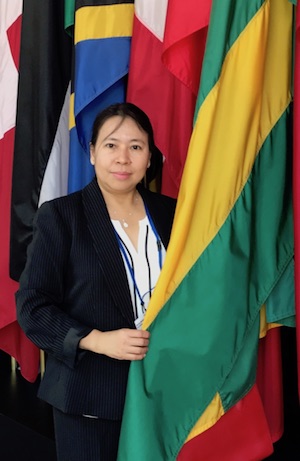
At the 2017 IMF-WB Spring Meeting
To have a fair balance between work and family, I sacrifice one whenever needed. In my free time, I like to travel and watch movies.
What are some of your fondest memories of your time spent at GRIPS? And what do you miss about Japan?
I really enjoyed staying at the Tokyo International Exchange Center (TIEC) in Odaiba, and taking the Yurikamome train from there to Shimbashi. One of the things I mostly miss is the old GRIPS campus in Wakamatsu-cho where we could enjoy the cherry blossoms in the backyard every spring. I also miss my friends and classmates and professors and staff of the Student Office.
If you could give one piece of advice to anyone considering studying at GRIPS what would it be?
GRIPS is a very good place to study, enjoy Japanese culture and gain exposure to different perspectives and challenges from which you will benefit in future life.
How would you like to maintain involved with the School? What do you expect from GRIPS as an alumnus and do you have any suggestions on how to further utilize the GRIPS alumni network?
Kindly keep building on what has been achieved so far to strengthen the alumni network. I highly appreciate the Alumni Office for all your endeavors.





